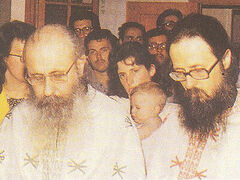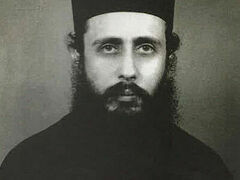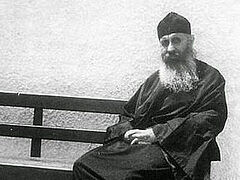Footnotes marked “—Trans.” are by Monk Sophrony (Vishnyak), who translated this text from Greek to Russian. Otherwise, they are from Archimandrite Athanasios (Papastavrou), a spiritual child of Elder Epiphanios who originally published this text in Greek with the Elder’s blessing.
***
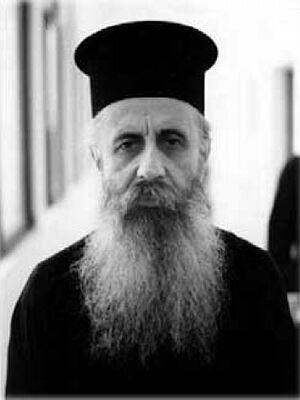 Fr. Epiphanios But time rushes on again… 1974, March 29, noon. During a break between meetings of the extraordinary Council of the Church of Greece, the joyful Metropolitan Theoklitos of Aetolia, whom I love dearly, calls me: “At the suggestion of Archbishop Seraphim,1 by unanimous vote, we just put you on the electoral lists without having to submit any documents. By the decision of the primate, honoris causa. Everyone voted for you, without exception. Not a single person was against it. I know, of course, that you don’t accept this elevation. But I was very pleased with the honor shown to you. Out of all of the clerics of Greece, only you and one other (note: then then-Archimandrite Panteleimon [Rodopoulos]) were recorded for their merits”…
Fr. Epiphanios But time rushes on again… 1974, March 29, noon. During a break between meetings of the extraordinary Council of the Church of Greece, the joyful Metropolitan Theoklitos of Aetolia, whom I love dearly, calls me: “At the suggestion of Archbishop Seraphim,1 by unanimous vote, we just put you on the electoral lists without having to submit any documents. By the decision of the primate, honoris causa. Everyone voted for you, without exception. Not a single person was against it. I know, of course, that you don’t accept this elevation. But I was very pleased with the honor shown to you. Out of all of the clerics of Greece, only you and one other (note: then then-Archimandrite Panteleimon [Rodopoulos]) were recorded for their merits”…
As soon as the conversation was over, I prepared and immediately sent a telegram thanking them but categorically and completely refusing my candidacy. That night, the Metropolitan of Eleftheroupoli called me, full of sorrow, but also anger, and fiercely reproached me for yet another refusal. Then he told me about what happened behind the scenes. During Archbishop Seraphim’s trip to Constantinople prior to the session, accompanied by the Metropolitan of Eleftheroupoli, the latter seized the opportunity, and he and the Archbishop “concocted” my elevation to the metropolitanate. (Eleftheroupoli hadn’t come into conflict with the Archbishop yet at that time. He abstained from voting, but maintained very friendly relations with him.) And since they knew that I didn’t desire any elevation, nor would I ever submit a petition and the other documents, they decided to enroll me in the electoral lists automatically by decision of the primate, without any documents (“We’re the authorities—we do what they want,” they agreed), assuming that I would take such a course of action as the voice of God, that it would break my objections and snatch up my consent… “But you,” he continued, “ruined everything with your stubbornness. I feel incredibly sad and disappointed because of you. Don’t you feel how much damage you’re causing the Church with your constant refusals?...” I offered a fitting reply, but he didn’t have the ears to hear. He was literally “seething”…
A few days later, I did my duty and visited the Archbishop to personally thank him for his love. He received me with great cordiality and complete openness. (His deposition hadn’t happened yet,2 and so our good relations were still completely unshaken). He hugged and kissed me and immediately began “scolding” me: “ What’s with this telegram you sent? What is that? Leave it alone and listen to the voice of the Church. You have so many abilities. Why do you refuse?...” “Your Beatitude, I’m not meant for all of this,” I said. “My soul finds peace elsewhere. Other things delight and attract me. Besides, heights make me dizzy, and cathedras are high. I prefer benches. They’re safe. ‘He who is lower than all, where will he fall?’ the Fathers say. But he who stands high is always in danger of falling and ‘breaking.’ A recent example: your predecessor. And very instructive…” He looked at me with some surprise: “Oh, is that so? That’s why you won’t accept? Out of self-interest?” “Yes, Your Beatitude, out of self-interest. But such self-interest—to love and desire the humble and the mundane, to fear and avoid heights and the dangers associated with them, is holy self-interest. The Scriptures teach this, the Fathers advise it, all the saints experienced it…” In the end, I thanked him warmly, but stated that no human effort could tear me away from the rank of presbyter to go higher… Thus this page was turned. Once again, I escaped the “frozen lake” and the “cave, burning with fire and brimstone”…
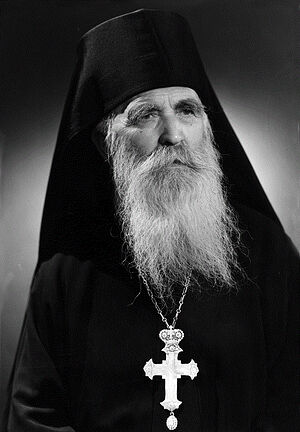 Elder Philotheos (Zervakos) Finally, I ask: Did I do wrong? From the depths of my soul resounds a thunderous cry, with the testimony of conscience: NO! A thousand times NO! I’ve never felt even the slightest hint of doubt about the correctness of my stance. But besides my conscience, I have some other “testimonies” that are very authoritative. Namely:
Elder Philotheos (Zervakos) Finally, I ask: Did I do wrong? From the depths of my soul resounds a thunderous cry, with the testimony of conscience: NO! A thousand times NO! I’ve never felt even the slightest hint of doubt about the correctness of my stance. But besides my conscience, I have some other “testimonies” that are very authoritative. Namely:
a) The letter written by the great, warm-hearted Gervasios, inspired by prophetic insight, approves, and indeed quite early, my refusal that followed many years later.
b) All my spiritual children have approved of my position unanimously, “with one mouth and one heart.”
c) God’s confirmation also came in the form of the opinion of my elder, the ever-memorable. Fr. Philotheos (Zervakos).3 Some of the people who wanted to see my advancement at that time (1967) met with him to try to persuade him to demand that I give in, confident that the voice of my spiritual father would put me in a tight spot. Since they thought he had bowed to their request, they thought they’d “won the game,” and told me to hurry up and go see him. I went to see him (he was in Athens at that time), and when we sat down to talk, he asked me why I don’t agree to become a bishop. I explained why and calmly looked at him, firmly convinced within that he wouldn’t be against it. He replied: “I’m not telling you anything. Neither yes nor no. You know better. Do as God enlightens you to do, as He shows you in your heart.”
d) Fr. Leonid Paraskevopoulos, seeing me on the day of my ordination, said: “You knew what you were doing. You’re very smart. You turned out to be smarter than all.”
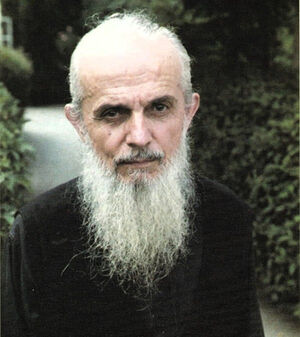 Metropolitan Kallinikos of Edessa e) The ever-memorable Metropolitan Kallinikos of Edessa4 told me many times: “I commend you, my brother. How wisely you have thought!”
Metropolitan Kallinikos of Edessa e) The ever-memorable Metropolitan Kallinikos of Edessa4 told me many times: “I commend you, my brother. How wisely you have thought!”
Finally,
f) former Metropolitan Ieronymos of Athens,5 having met with Fr. Daniel (Aerakis) about two years ago, asked him about me, about my health and something else. Fr. Daniel said I was already fine, that I’d already had my gastric bypass in 1982, and so on. Ieronymos wrote down my number to agree on a time to meet. (I hadn’t seen him since 1968 or 1969!...). And he added in conversation with Fr. Daniel about me: “He really upset me with his refusal to become a metropolitan then. But later, I gave him his due. He did well. He is much more beneficial to the Church the way he is…” So what need have we of any more witnesses or testimonies?
I end and seal this letter with the words of Archbishop Chrysostomos (Papadoulos) of Athens of blessed memory, uttered by him shortly before his death, which my nephew preserved: “I did an injustice to science and to myself in becoming an archbishop… I could have had a peaceful life… I became the archbishop and plunged into the abyss of problems and misunderstandings, unaware of the malice and machinations of men…6
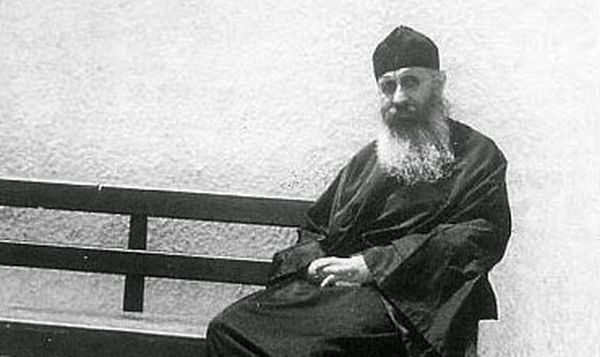 Fr. Epiphanios in the last years of his life
Fr. Epiphanios in the last years of his life
This is what, my dear Athanasios, I had to say to your love as an “apology” for my refusal to ascend the metropolitan cathedra. I trust that I have convinced you of the correctness of my behavior. I fervently implore you not to tell anyone about the contents of this letter which is written simply and solely to appease your thoughts, which, although didn’t seem shaken to me today, I can’t know how it (this thought) will change in the future. It’s good to always have “opposing thoughts” at the ready…
I ask you not to cease praying for me, remaining much and deeply loving and honoring you in Christ Jesus our Lord.
Epiphanios I. Theodoropoulos,
presbyter.
P.S. Needless to say, from my point of view, not only about the nomination to the episcopate, but also about all the rest (ordination in a narrow circle, without speeches and response speeches, not using the liturgical distinctions of an archimandrite, preferring the ‘second place’ at the Divine services, carrying out my priestly ministry free of charge, and so on), I have always looked only at my personal business, that is, as a matter befitting and corresponding to my personal character, my personal way of thinking, my personal nature.
I’ve never considered it an “example” for others and never even thought of it as a “policy” for those close to me, including those who make up my most immediate spiritual circle. I’ve never resisted the legitimate desires of my spiritual children, never sought in the slightest to make their characters like my own, never set myself up as an “example for imitation,” never followed the “tactics” of dissolving anyone into the collective, of assimilating or equalizing everyone. Everyone from my circle acts according to his own inclinations and aspirations. You know from your own observations that the ordinations of all my spiritual children were celebrated festively, in filled churches, with speeches and responses, that those of them who have the appropriate rank, married or unmarried, freely enjoy their liturgical distinctions, that those who labor in the world all have their places and salaries, etc., etc. And if tomorrow one of them should be called to the episcopacy, without seeking it himself, and his soul will be at peace about it, then he will receive my consent from the bottom of my heart.
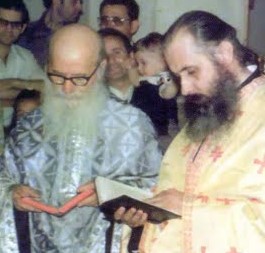 Fr. Epiphanios celebrating a Baptism together with St. Porphyrios This is how I think, this is how I teach, this is how I act, because I believe, according to the God-inspired saying, that there are diversities of gifts, but the same Spirit. And there are differences of administrations, but the same Lord. And there are diversities of operations, but it is the same God Which worketh all in all. But the manifestation of the Spirit is given to every man to profit withal. For to one is given by the Spirit the word of wisdom; to another the word of knowledge by the same Spirit; To another faith by the same Spirit; to another the gifts of healing by the same Spirit; To another the working of miracles; to another prophecy; to another discerning of spirits; to another divers kinds of tongues; to another the interpretation of tongues: But all these worketh that one and the selfsame Spirit, dividing to every man severally as he will (1 Cor. 12:4-11). I feel the greatest satisfaction and inexpressible joy from the fact that I’m a priest; that the Holy Spirit, by His immeasurable long-suffering and condescension, gave me the grace of the priesthood. It’s a great thing to be an ambassador for Reagan, or Gorbachev, or Mitterand, or Elizabeth of England. But I (“when I say, ‘I,’ I mean a priest,” in imitation of the golden-tongued father7), insignificant, pitiful, and unworthy, am an ambassador of His Majesty the Most High God, Creator and Ruler of the universe. What can be greater than that? What can be higher? What is more excellent? “My mind is filled with awe, and my thoughts marvel,”8 at the thought that my frail and sin-defiled hands, blessing the bread and wine, transform them through the grace of the priesthood given to me, into the very Body and Blood of my Lord; touching the head of the penitent, they cleanse him of the greatest sins; immersing infants (or adults) in water, they lift them out as angelic citizens of the Kingdom of Heaven, etc. etc… What more should I look for? What else should I strive for? My soul overflows with gratitude to God for this inscrutable gift of his to my wretchedness. Who was I to be vouchsafed such an honor? I loudly “confess grace, proclaim mercy, not concealing benefactions.” The Lord had shewed great mercy upon me.9 The grace of the priesthood is sufficient, more than sufficient for me, and beyond my strength. I only ask and implore God the Trinity to grant me to preserve the “pledge given to me until the Second Coming of our Lord Jesus Christ.”10 And you pray for the same…
Fr. Epiphanios celebrating a Baptism together with St. Porphyrios This is how I think, this is how I teach, this is how I act, because I believe, according to the God-inspired saying, that there are diversities of gifts, but the same Spirit. And there are differences of administrations, but the same Lord. And there are diversities of operations, but it is the same God Which worketh all in all. But the manifestation of the Spirit is given to every man to profit withal. For to one is given by the Spirit the word of wisdom; to another the word of knowledge by the same Spirit; To another faith by the same Spirit; to another the gifts of healing by the same Spirit; To another the working of miracles; to another prophecy; to another discerning of spirits; to another divers kinds of tongues; to another the interpretation of tongues: But all these worketh that one and the selfsame Spirit, dividing to every man severally as he will (1 Cor. 12:4-11). I feel the greatest satisfaction and inexpressible joy from the fact that I’m a priest; that the Holy Spirit, by His immeasurable long-suffering and condescension, gave me the grace of the priesthood. It’s a great thing to be an ambassador for Reagan, or Gorbachev, or Mitterand, or Elizabeth of England. But I (“when I say, ‘I,’ I mean a priest,” in imitation of the golden-tongued father7), insignificant, pitiful, and unworthy, am an ambassador of His Majesty the Most High God, Creator and Ruler of the universe. What can be greater than that? What can be higher? What is more excellent? “My mind is filled with awe, and my thoughts marvel,”8 at the thought that my frail and sin-defiled hands, blessing the bread and wine, transform them through the grace of the priesthood given to me, into the very Body and Blood of my Lord; touching the head of the penitent, they cleanse him of the greatest sins; immersing infants (or adults) in water, they lift them out as angelic citizens of the Kingdom of Heaven, etc. etc… What more should I look for? What else should I strive for? My soul overflows with gratitude to God for this inscrutable gift of his to my wretchedness. Who was I to be vouchsafed such an honor? I loudly “confess grace, proclaim mercy, not concealing benefactions.” The Lord had shewed great mercy upon me.9 The grace of the priesthood is sufficient, more than sufficient for me, and beyond my strength. I only ask and implore God the Trinity to grant me to preserve the “pledge given to me until the Second Coming of our Lord Jesus Christ.”10 And you pray for the same…

